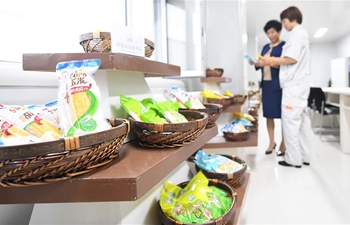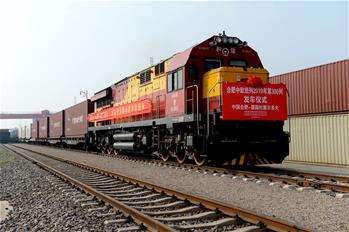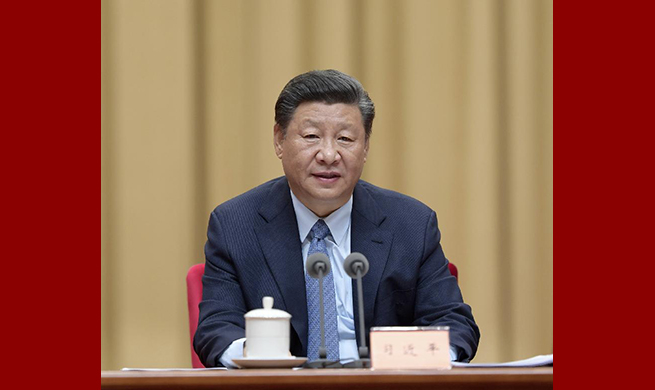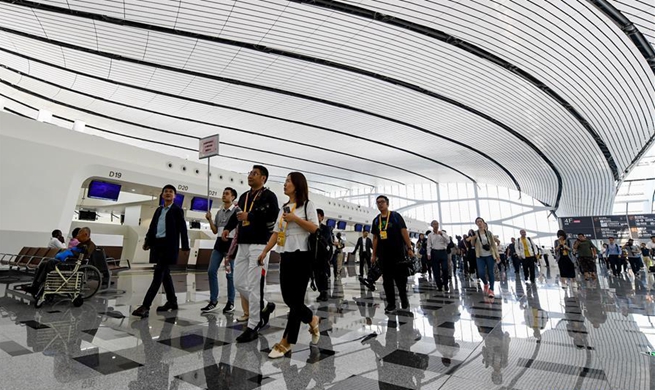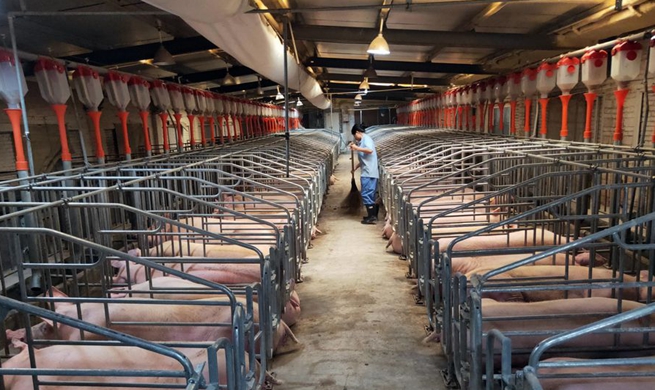by Dana Halawi
BEIRUT, Sept. 28 (Xinhua) -- The big deficit in the balance of payments caused by policies by Lebanon's successive governments is behind the shortage in supply of U.S. dollars in the Lebanese market, experts said.
A scarcity of U.S. dollars is causing a crisis for Lebanese citizens and businesses.
Foreign exchange reserves at the Central Bank of Lebanon reached an all-time high of 45.7 billion dollars in May 2018, according to CEIC data.
However, the economic slowdown and the drop in cash injections from Lebanese abroad have reduced the central bank's foreign currency reserves, leading to a shortage in dollar for both businesses and individuals.
For instance, gas stations in Lebanon lately reported great financial losses because they are buying fuel from oil importing companies by paying in dollars while they are selling it to clients in Lebanese pounds.
Meanwhile, gas station owners need the dollars because they pay their suppliers with the U.S. currency.
Banks have been reluctant in issuing dollars, causing gas station owners to go to currency exchange offices that have been charging 1,525 or 1,550, and in some cases, 1,600 Lebanese pounds for one dollar, which is higher than the fixed official rate of 1,507.
It goes the same with Lebanese millers who said that wheat stocks had fallen to a dangerous level, warning the country may face a supply crisis unless dollars needed to import the grain are supplied at the official rate.
"We lose our dollars when we have balance of payments deficit ... In Lebanon, we have been having more dollars going out than coming into the country," Mounir Rached, president of the Lebanese Economic Association, told Xinhua.
According to the Central Bank of Lebanon, Lebanon's balance of payments witnessed a deficit of 1.93 billion dollars by February compared with 165.2 million dollars surplus during the same period in 2018.
"There is a concern that if the central bank continues not to supply the market with what it needs, people will lose their trust in the banking system and more people will take their money out," he said.
Rached explained that the underlined cause behind all these is the fiscal deficit which has reached 11.5 percent of GDP in 2018 in addition to high interest rates which makes it very expensive for people to borrow money and buy houses or make other spendings.
"This causes lower spending and a recession. All of these factors do not encourage foreign investors to invest in real estate or any other sector in the country," he said.
"If the central bank depletes its foreign exchange quickly, it will not have any money to supply the market ... The dollar would go up rapidly," he added.
Dory Daw, professor and researcher, attributed the shortage in dollars to the increase in interest rates provided by commercial banks on deposits which frightened clients.
"This may convey a message to clients that there is a danger in some places, prompting them to remove their money from banks in some cases," he said.
Daw added that money that used to be sent to Lebanon between 2005 and 2011 from the Gulf and Africa has stopped because the Lebanese in Africa are suffering from currency devaluation while the Lebanese who are in the Gulf suffer from lower oil prices and income.
Daw added that Lebanon's economy is not productive to support sectors such as trade, industry and agriculture.
He added that the year of 2005 witnessed exports in services worth 3 billion dollars but these have dropped by half.
The professor said that all of these factors are likely to impact the balance of payments which would cause shortage in dollars.
Meanwhile, Nassib Ghobril, economist and head of the economic research department at Byblos Bank, said that one of the factors behind the shortage in dollars is people's attempts to withdraw dollars currency from their Lebanese banks accounts at ATM machines.
Through this way, banks automatically convert the money withdrawn from Lebanese accounts into dollars at the official rate of 1,507 Lebanese pounds while people take their dollars and sell them to money exchange dealers for higher rates.
"This led banks to take measures to limit the dollar withdrawal to dollar banks accounts," he said.
Economists interviewed by Xinhua agreed that the solution to the crisis stems from exerting huge efforts by reducing the fiscal deficit in different ways such as the overhaul of the electricity sector and reducing allowances of public sector employees.




